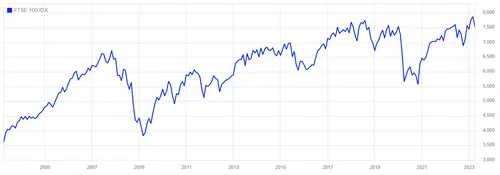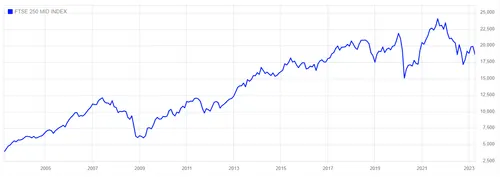Our partner, XM, lets you access a free demo account to apply your knowledge.
No hidden costs, no tricks.

The London Stock Exchange is one of the oldest equity exchanges in the world. Millions of investors trade on the exchange each day to gain access to stocks from the UK, as well as the rest of Europe and other countries.
The London Stock Exchange is especially famous for the number of mining companies that it hosts. Generally, the exchange is primarily home to well-established, mature companies from the UK and the rest of Europe, but also features a number of other companies from around the world, including South Africa and Japan. In total, the exchange hosts stocks from over 60 countries around the globe, making it one of the most active stock exchanges in the world.
"We at the London Stock Exchange Group, as we have been thinking about where we want and need to be in the years to come, to not only continue to be a leading financial market infrastructure but also to enhance that position, we have been looking closely at a couple key trends and a couple key drivers of change" - David Schwimmer

The London Stock Exchange is a prestigious market that prides itself on the quality of the stocks traded there. This is why the LSE upholds listing standards and rules that companies need to comply with in order to obtain and maintain a spot on the exchange.
Some of the requirements companies need to meet include:
These requirements serve to make sure that the companies listing their shares on the LSE are financially stable enough to sustain their operations after the listing has been finalized.
As a for-profit exchange, the LSE generates revenues through a number of services offered to listed companies and institutional investors:
A company seeking to list its shares on the London Stock Exchange must pay one-time entry and recurring listing maintenance fees. The fee structure, which is calculated based on the market capitalization of the listed company can be broken down as follows:
Above are the standard fees applicable to all public companies seeking to obtain a listing category on the London Stock Exchange. Most of the fees charged by the LSE and FCA are based on market capitalization, with larger companies paying more in fees.
The FTSE is the most followed market index on the London Stock Exchange. The index consists of the 100 largest companies listed on the exchange.
The FTSE 100 is a market capitalization-weighted index that includes 100 companies from various industries that make up the bulk of the exchange’s capitalization. The FTSE 100, as well as other indices under the FTSE brand, are maintained and operated by the FTSE Group, which is a subsidiary of the LSE.
The value of the index is calculated in real-time and updated by the second. The FTSE 100 reached its highest index value of 8,047.06 on 16 February 2023.

As already mentioned, the FTSE 100 is a market capitalization-weighted index. The weights of stocks composing the index by industry are as follows:
| Sector | % Weight |
|---|---|
| Communications | 3.27% |
| Consumer Discretionary | 6.12% |
| Consumer Staples | 19.38% |
| Energy | 13.02% |
| Financials | 17.67% |
| Health Care | 12.32% |
| Industrials | 10.04% |
| Information Technology | 0.98% |
| Materials | 12.29% |
| Real Estate | 1.06% |
| Utilities | 3.85% |
The FTSE 100 index includes some of the largest retailers and financial companies across Europe, which leads to the outsized weighting of these industries. The LSE is home to some of the largest mining and energy companies in the world, which is also evident from the table.
Following the FTSE 100, the FTSE 250 is a market capitalization-weighted index that consists of the 101st to the 350th largest companies on the LSE. The index is primarily made up of middle-cap companies from a variety of industries.
The FTSE 250 is a capitalization-weighted index operated by the FTSE Group. The index tracks the 250 largest public companies following the FTSE 100. The index is updated in real-time and published during trading hours. Alongside the FTSE 100, the FTSE 250 is part of the FTSE 350 index, which combines the two indexes to show the benchmark performance of the largest public companies on the London Stock Exchange.

As a capitalization-weighted index, the FTSE 250 is home to a broad range of companies from different industries, which are allocated as follows:
| Industry | Weight | Number of Constituents |
|---|---|---|
| Technology | 3.08% | 18 |
| Telecommunications | 0.98% | 6 |
| Health Care | 3.83% | 14 |
| Financials | 42.56% | 254 |
| Real Estate | 8.83% | 55 |
| Consumer Discretionary | 15.23% | 83 |
| Consumer Staples | 3.75% | 24 |
| Industrials | 15.85% | 83 |
| Basic Materials | 2.23% | 22 |
| Energy | 2.24% | 13 |
| Utilities | 1.40% | 8 |
As we can see from the table, the financial sector has an outweighed influence on the FTSE 250, as it is home to a large number of financial institutions from around the world that are double-listed on the London Stock Exchange - hence the number of listed financial companies account for over 40% of total weight attributable to the index.
Aside from the FTSE 100 and FTSE 250, the LSE is also home to other important market indices, such as:
Our partner, XM, lets you access a free demo account to apply your knowledge.
No hidden costs, no tricks.
The total market capitalization of the 2,400+ stocks listed on the London Stock Exchange adds up to over $3.5 trillion, which makes the LSE the fourth largest stock exchange in the world by market capitalization, behind only the NYSE, Nasdaq, and the Tokyo Stock Exchange.
The largest stock listed on the London Stock Exchange by market capitalization is AstraZeneca. The company had a market cap exceeding GBP 167 billion as of March 17, 2023.
The London Stock Exchange is home to over 2,400 stocks from a variety of industries, including health care, technology, financials, utilities, industrials, energy, consumer discretionaries, etc.